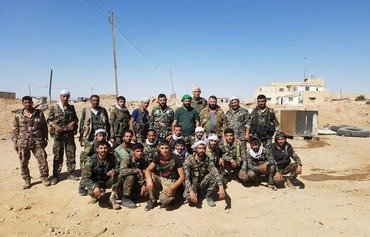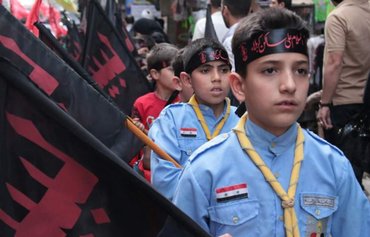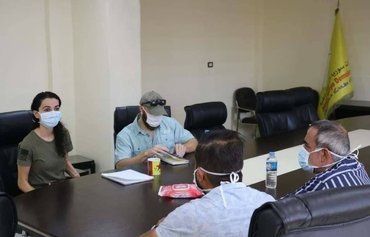CAIRO -- Residents of the city of al-Hasakeh in northeastern Syria woke up on June 28 to find anti-Hizbullah leaflets strewn in the Security Square area, which is controlled by Syrian regime forces and their affiliated militias.
The message, disseminated quickly on paper and on social media, was titled "Lebanese Pilgrims Among Us".
It featured a crossed-out photo of Hizbullah Secretary-General Hassan Nasrallah and the slogan, "No to Hizbullah, no to evil Nasr in al-Hasakeh."
"The Lebanese Hizbullah is Iran's most important proxy militia, and wherever it goes, instability prevails and heinous crimes are committed," the text said.
![An anti-Hizbullah poster on a wall in al-Hasakeh. [Youth Union of Hasakah/Facebook]](/cnmi_di/images/2022/07/06/36112-3-600_384.jpg)
An anti-Hizbullah poster on a wall in al-Hasakeh. [Youth Union of Hasakah/Facebook]
![Shops in al-Hasakeh are seen closed on June 27 as merchants strike to protest the city's deteriorating security situation and widespread theft. [Youth Union of Hasakah/Facebook]](/cnmi_di/images/2022/07/06/36114-4-600_384.jpg)
Shops in al-Hasakeh are seen closed on June 27 as merchants strike to protest the city's deteriorating security situation and widespread theft. [Youth Union of Hasakah/Facebook]
It said that the party "gets its funding from the smuggling and transfer of illegal drugs, without any regard for the harm such activities cause", adding that every month, Hizbullah brings in "more and more weapons into al-Hasakeh".
According to the leaflet, Hizbullah conceals its presence in the regime's bases in the Security Square and is secretly working to undermine security and stability.
Led by an operative named Hajj Mahdi, it said, the party attempts to recruit al-Hasakeh's youth and "turn them against their own families by making them agents of foreign forces".
The message concluded by saying, "We, the people of al-Hasakeh, do not accept this. We have suffered enough. We do not want or appreciate Hizbullah's presence in our city."
Rapidly increasing IRGC activity
Media activist Ammar Saleh said this is the first time the public has openly expressed frustration with Hizbullah's presence in al-Hasakeh, causing confusion and disarray in the ranks of the Syrian regime's security forces.
These forces have imposed strict security measures and are in a heightened state of alert in anticipation of public protests spreading, Saleh said.
Al-Hasakeh is strategic for Iran's Islamic Revolutionary Guard Corps (IRGC) due to its proximity to areas where the United States maintains a presence, said Syrian journalist Mohammed al-Abdullah.
The presence of Iran-aligned groups in al-Hasakeh also "strengthens their position in the face of the Syrian Democratic Forces (SDF)", he said, making it possible for them to "exploit any security vacuum caused by clashes between Turkey and those forces".
IRGC forces are also thirsty for "the oil and agricultural wealth for which the region is famous", al-Abdullah added.
Rapidly increasing IRGC activity in the cities of al-Hasakeh and Qamishli (near the border with Turkey) could be part of Iran exploiting Russia's recently diminished presence in Syria in light of the war on Ukraine, he said.
The IRGC may be using the vacuum to secure control of the Yaroubiya border crossing that links Iraq with Syria, which would facilitate the movement of IRGC elements and its affiliates between the two countries, he said.
Recruitment efforts
Somaya al-Issa, a volunteer with a local charitable organisation in al-Hasakeh province, said the IRGC's influence in the al-Hasakeh region slowly emerged in 2013 in regime-controlled areas.
However, she said, since last year, that presence began to grow with an increased number of "Lebanese pilgrims" -- a name referring to Hizbullah commanders -- in and around the Security Square.
Hizbullah has also opened several offices to recruit young Syrians and deploy them to fight for the party, the IRGC and their affiliated militias, she said.
Dozens of young people have been recruited and trained in Hizbullah's camps in Lebanon and Homs, said al-Issa.
The recruitment process is led by a party commander called "Hajj Mahdi", she said, whose real name is rumoured to be Mohammed Shamseddine, from a Shia village in the Mount Lebanon region.
Al-Issa said Hajj Mahdi is a member of the first generation that joined Hizbullah in the 1980s and had a major role in suppressing the demonstrations that broke out at the start of the Syrian war.
He is currently one of the top officials in charge of recruitment, she said.
Hizbullah has succeeded in making connections with the area's tribes and convincing their elders to agree to the recruitment of their youth by the IRGC, she said. One of these tribes is al-Tayy, the largest in the al-Hasakeh region.
Hizbullah and IRGC officials are attempting to sow discord between the region's Arab and Kurdish communities and mislead them, she said.
Their attempt is to lead the region's Arab communities to incorrectly believe that the SDF intends to seize control of the region, steal its resources and impoverish the Arab population, said al-Issa.

![A leaflet distributed in the Syrian city of al-Hasakeh features a crossed-out photo of Hizbullah's Secretary-General Hassan Nasrallah. [Youth Union of Hasakah/Facebook]](/cnmi_di/images/2022/07/06/36111-1-600_384.jpg)






